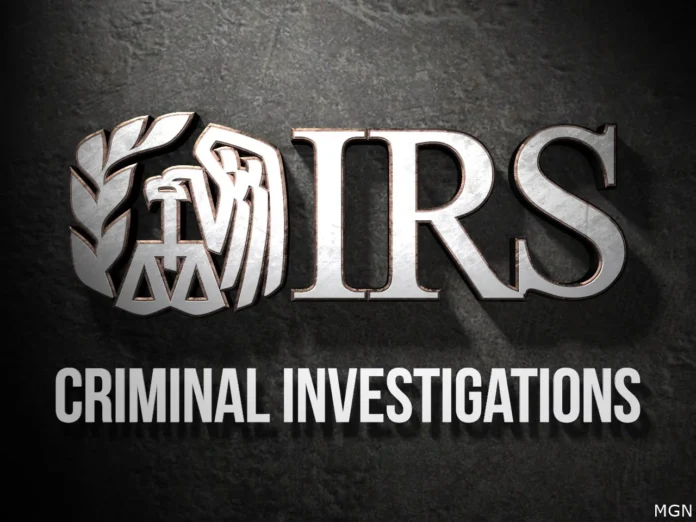The IRS-Criminal Investigation Washington, D.C. Field Office investigated 84 of the agency’s more than 660 tax and money laundering cases related to alleged COVID fraud, totaling $1.8 billion since the Coronavirus Aid, Relief, and Economic Security (CARES) Act was signed into law nearly two years ago.
These cases involved a broad range of criminal activity, including unemployment fraud, fraudulently obtained loans, credits and payments meant for American workers, families, and small businesses.
The IRS-CI Washington, D.C. Field Office is responsible for investigating financial cases in the District, Maryland, Virginia and West Virginia as well as cybercrimes and international financial and tax investigations.
“It’s unfortunate that many criminals thought they could take advantage of a crisis and defraud taxpayers while diverting relief from people who truly needed it,” said Darrell Waldon, special agent in charge of the IRS-CI Washington, D.C. Field Office. “Our field office’s special agents have successfully rooted out these crimes and continue to pursue those who committed COVID fraud.”
The consequences include a 100% conviction rate for prosecuted cases with prison sentences averaging 42 months on average nationally, although some of the Washington, D.C. Field Office’s cases greatly exceeded that average.
Field office special agents investigated a southwest Virginia couple and a brother who were the ring leaders of a Pandemic Unemployment Assistance Program fraud scheme. They conspired with 35 others, including 15 inmates, to file false claims to get pandemic-related unemployment benefits, defrauding the government of at least $499,000. Gregory Tackett and Leelynn Chytka both received 108 months in federal prison, or 9 years each, for their crimes while the brother, Jeffrey Tackett, got 102 months.
Additional case examples of the IRS-CI DC Field Office include:
- District man pleads guilty in schemes to defraud small business pandemic relief programs and the Archdiocese of Washington | Internal Revenue Service (irs.gov)
Washington, D.C. resident Kenneth Gaughan fraudulently obtained more than $2.1 million in federal Paycheck Protection Program and Economic Injury Disaster Loan Program funds by using a stolen identity and phony service-animal organizations. Gaughan used funds from the two programs, in part, to purchase a $300,000 yacht, a $1.13 million D.C. rowhouse, $46,000 luxury sports sedan, pay off his student loans, satisfy a civil judgment, and make significant payments on personal credit cards. Gaughan recently pleaded guilty to wire fraud and unlawful monetary transactions and is awaiting sentencing. - Senior NASA employee sentenced for COVID-19 related loan fraud | Internal Revenue Service (irs.gov)
A Senior Executive Service employee of the National Aeronautics and Space Administration was sentenced last July to 18 months in prison for submitting fraudulent applications to request over $350,000 in Paycheck Protection Program and Economic Injury Disaster Loan Program relief funds. He also applied for COVID-related unemployment for his retired mother-in-law. With the $285,000 he received from the PPP loan, he among other things, paid off a loan for a pool, a loan for a minivan, and credit card debt. He also used the funds for a down payment on a new car and a dog.
IRS-CI encourages the public to share information regarding known or suspected fraud attempts against any of the programs offered through the CARES Act. To report a suspected crime, taxpayers may visit IRS.gov.
The CARES Act was signed into law on March 27, 2020, to provide emergency financial assistance to millions of Americans suffering the economic effects of the COVID-19 pandemic. One source of relief provided by the CARES Act was the authorization of up to $349 billion in forgivable loans to small businesses for job retention and certain other expenses, through the PPP. In April 2020, Congress authorized over $300 billion in additional funding, and in December 2020, another $284 billion.
The Paycheck Protection Program allows qualifying small businesses and certain other organizations to receive loans with a maturity of two to five years and an interest rate of 1%. Businesses must use PPP loan proceeds for payroll costs, interest on mortgages, rent and utilities. The PPP allows the interest and principal to be forgiven if businesses spend the proceeds on these expenses within a set time period and use at least a certain percentage of the loan towards payroll expenses.
To learn more about COVID-19 scams and other financial schemes visit IRS.gov. Official IRS information about COVID-19 and Economic Impact Payments can be found on the Coronavirus Tax Relief page, which is updated frequently.

